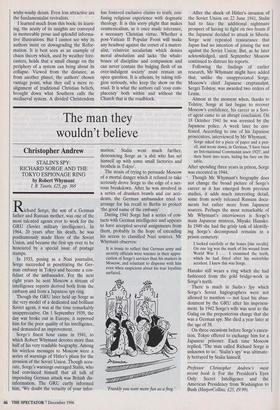The man they wouldn't believe
Christopher Andrew
STALIN'S SPY: RICHARD SORGE AND THE TOKYO ESPIONAGE RING by Robert Whymant I. B. Tauris, £25, pp. 368 Richard Sorge, the son of a German father and Russian mother, was one of the most talented agents ever to work for the GRU (Soviet military intelligence). In 1964, 20 years after his death, he was posthumously made Hero of the Soviet Union, and became the first spy ever to be honoured by a special issue of postage stamps.
In 1933, posing as a Nazi journalist, Sorge succeeded in penetrating the Ger- man embassy in Tokyo and become a con- fidant of the ambassador. For the next eight years he sent Moscow a stream of intelligence reports derived both from the embassy and from a Japanese spy ring.
Though the GRU later held up Sorge as the very model of a dedicated and brilliant Soviet agent, it was at the time remarkably unappreciative. On 1 September 1939, the day war broke out in Europe, it reproved him for the poor quality of his intelligence, and demanded an improvement.
Sorge's finest hour came in 1941, to which Robert Whymant devotes more than half of his very readable biography. Among his wireless messages to Moscow were a series of warnings of Hitler's plans for the invasion of the Soviet Union. Though accu- rate, Sorge's warnings outraged Stalin, who had convinced himself that all talk of impending German attack was British dis- information. The GRU curtly informed him, 'We doubt the veracity of your infor- mation.' Stalin went much further, denouncing Sorge as 'a shit who has set himself up with some small factories and brothels in Tokyo'.
The strain of trying to persuade Moscow of a mortal danger which it refused to take seriously drove Sorge to the edge of a ner- vous breakdown. After he was involved in a series of drunken brawls and car acci- dents, the German ambassador tried to arrange for his recall to Berlin to protect the good name of the embassy'.
During 1941 Sorge had a series of con- tacts with German intelligence and appears to have accepted several assignments from them, probably in the hope of extending his access to classified Nazi sources. Mr Whymant observes: It is ironic to reflect that German army and security officials were warmer in their appre- ciation of Sorge's services than his masters in Moscow, and reluctant to dispense with him even when suspicions about his true loyalties surfaced.
'Frankly you were more fun as a frog.' After the shock of Hitler's invasion of the Soviet Union on 22 June 1941, Stalin had to face the additional nightmare prospect of having to fight on two fronts if the Japanese decided to attack in Siberia. Sorge sent repeated reassurance that Japan had no intention of joining the war against the Soviet Union. But, as he later acknowledged, until September Moscow continued to distrust his reports.
Following the findings of earlier research, Mr Whymant might have added that, unlike the unappreciated Sorge, Moscow's chief Japanese cryptanalyst, Sergei Tolstoy, was awarded two orders of Lenin.
Almost at the moment when, thanks to Tolstoy, Sorge at last began to recover Moscow's confidence, his career as a Sovi- et agent came to an abrupt conclusion. On 18 October 1941 he was arrested by the Japanese police. A week later he con- fessed. According to one of his Japanese prosecutors, interviewed by Mr Whymant,
Sorge asked for a piece of paper and a pen- cil, and wrote down, in German, 'I have been an International Communist since 1925', and then burst into tears, hiding his face on the table.
After spending three years in prison, Sorge was executed in 1944.
' Though Mr Whymant's biography does not change the broad picture of Sorge's career as it has emerged from previous studies, it adds much interesting detail, some from newly released Russian docu- ments but rather more from Japanese sources. Perhaps the most remarkable of Mr Whymant's interviewees is Sorge's main Japanese mistress, Miyake Hanako. In 1949 she had the grisly task of identify- ing Sorge's decomposed remains in a prison cemetery:
I looked carefully at the bones [she recalls]. On one leg was the mark of his wound from
World War I . I examined the teeth, which he had fitted after his motorbike accident. I knew this was Sorge.
Hanako still wears a ring which she had fashioned from the gold bridge-work in Sorge's teeth.
There is much in Stalin s' Spy which Sorge's Soviet hagiographers were not allowed to mention — not least his aban- donment by the GRU after his imprison- ment. In 1942 Sorge's wife was sent to the Gulag on the preposterous charge that she was a German spy. She died a year later at the age of 38.
On three occasions before Sorge's execu- tion, Tokyo offered to exchange him for a Japanese prisoner. Each time Moscow replied, 'The man called Richard Sorge is unknown to us'. 'Stalin's spy' was ultimate- ly betrayed by Stalin himself.
Professor Christopher Andrew's most recent book is For the President's Eyes Only: Secret Intelligence and the American Presidency from Washington to Bush (HaTerCollins, £25, £9.99).


















































































 Previous page
Previous page